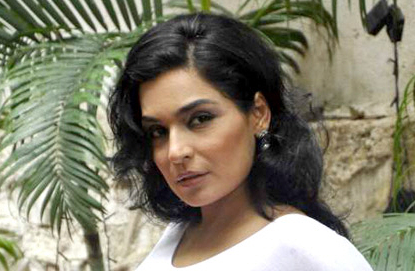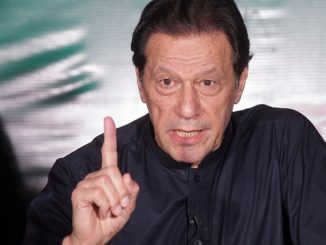
A Pakistani actress is embroiled in a seven-year-long court case over whether she is married or not.
Irtiza Rubab, who is known by her stage name Meera, has acted in commercially successful films, and won local awards for her work.
Now, she’s making headlines for another reason – because of a court battle against a man who alleges he’s her husband.
Who is Meera?
She’s considered a well-known actress in Lollywood – that is, Pakistani’s film industry in Lahore.
In addition to local films, the 40-year-old has also starred in Bollywood films and has previously expressed a desire to get involved in politics.
She is also known for her social media videos, and for her presentation style, which many find entertaining.
Pakistanis like teasing her about her accented English – something she tends to take sportingly – and a recent video of her singing the Titanic theme song, My Heart Will Go On, went viral, delighting and horrifying many.
How did she get embroiled in the controversy?
In 2009, Ateeq-ur-Rehman a businessman from Faisalabad, told journalists he had married Meera in a private ceremony in 2007.
He said he was unhappy Meera hadn’t acknowledged him publicly as her husband, and was still telling her fans she was single.
He even produced a marriage certificate as “proof” of their marriage, and said he had filed several court petitions against Meera.
In the applications, he argued she should be medically examined to prove she is his wife, that she should not marry anyone else before divorcing him, that he should have possession of a house where she is living, and that she should be restrained from going abroad.
Speaking to the BBC, Meera’s lawyer Balakh Sher Khosa said that a medical application seeking a “virginity test” for Meera had been filed by Mr Rehman, who claimed that the actress is not a virgin and that she was lying about being single.
“This particular application was later dismissed by the Lahore High Court. In Pakistan, such medical applications allow the virginity tests of women in rape and adultery cases where the woman has to establish that she has lost her virginity as a result of the committed crime.
“But in cases similar to that of Meera, calling someone their wife or husband, the virginity test can only be allowed with the consent of the involved woman. Ateeq’s claim was baseless – that’s why the court dismissed it.”
Meera has denied all of Mr Rehman’s claims, and insisted she is not married to anyone. She also filed a countersuit in 2010, challenging the marriage certificate.
Who should we believe?
The case made headlines across Pakistan when it first emerged. And public opinion is divided.
Meera has dismissed Mr Rehman as “disturbed and hungry for fame”.
She told the BBC Mr Rehman was a promoter who she had met through a friend, and worked with on a few concerts and tours.
“One day out of nowhere he presented some fake photographs claiming that we are married… How can he be allowed to call me his wife?”
She argues that she would never have such a low-profile marriage in any case. “I am a celebrity, would I ever get married in a room so simply?”
Meanwhile, Mr Rehman’s lawyer, Ali Bokhari, told the BBC: “He has married Meera in the presence of her mother and uncle. Meera should accept that she is Ateeq’s wife.”
Do people really go to court to prove they’re ‘married’ to someone?
Yes – this has happened several times at family courts in Pakistan – although this is the first case involving a celebrity.
Typically, the cases have involved a man filing a court case, arguing that his alleged spouse should not be allowed to marry someone else.
Some men have produced fake marriage certificates in the past – in those cases, the woman can normally win the case after proving that there was never a marriage registered with the local council. But it can be a lengthy process.
Meera’s case, which has lasted seven years, has brought attention to how slow Pakistan’s family courts can be.
She has argued that the claims have hurt her reputation, and made it difficult for her to get married until the case is resolved.
“I want to get married and have children, time is running out. Indeed my work and mental well-being is affected by all this but I continue to work and travel, thankfully there are no restrictions on that,” she said.
What happens now?
The marriage row has rumbled on for seven years – but may finally be reaching a conclusion.
Meera’s lawyer accuses Ateeq-ur-Rehman of delaying tactics to prolong the case.
“Ateeq’s lawyer has been changed so many times that I have lost count now. They hardly ever come to the court when the case is heard,” Balakh Sher Khosa told the BBC.
“Of course there are some other minor hurdles also, like transfer and absentia of related judge. I am the third lawyer for Meera but the delay has never been from our side as Meera has already recorded her statement back in 2011.”
Last week, a family court within the civil courts in Lahore finally dismissed Mr Rehman’s application that Meera be prevented from marrying anyone else without a divorce.
Even that did not bring matters to a close, however.
Judge Babar Nadeem said the court had not yet decided whether the marriage certificate was genuine or fabricated – but that under the Family Court Act 1964, Meera could not be restrained from marrying anyone.
However, he added that if Mr Rehman is later able to prove that he and Meera are married, the actress will be responsible for any legal consequences.
Meera is still considering this a victory, saying: “Justice has finally been served.”
Judge Nadeem has instructed both counsels to finish their arguments as soon as possible, and says a final court decision will be given before 30 December 2017.
Source: bbc.co.uk






Be the first to comment